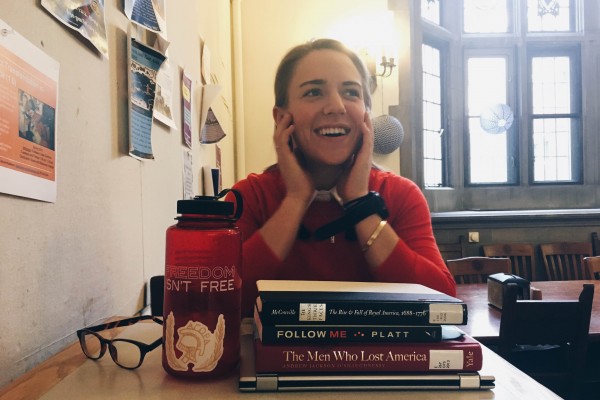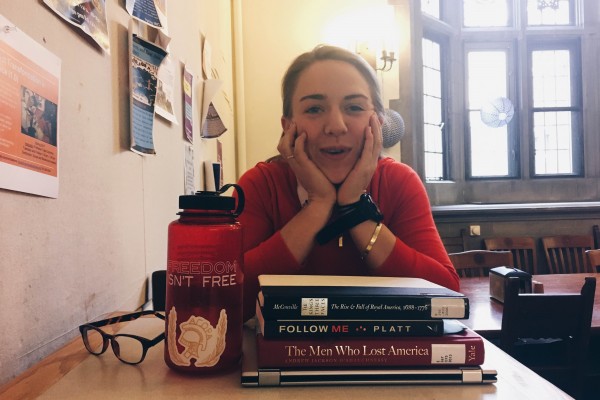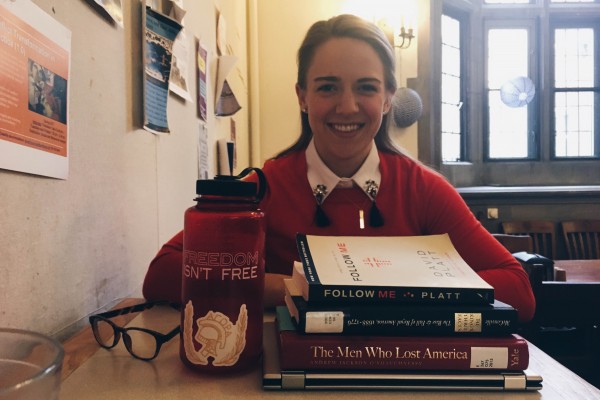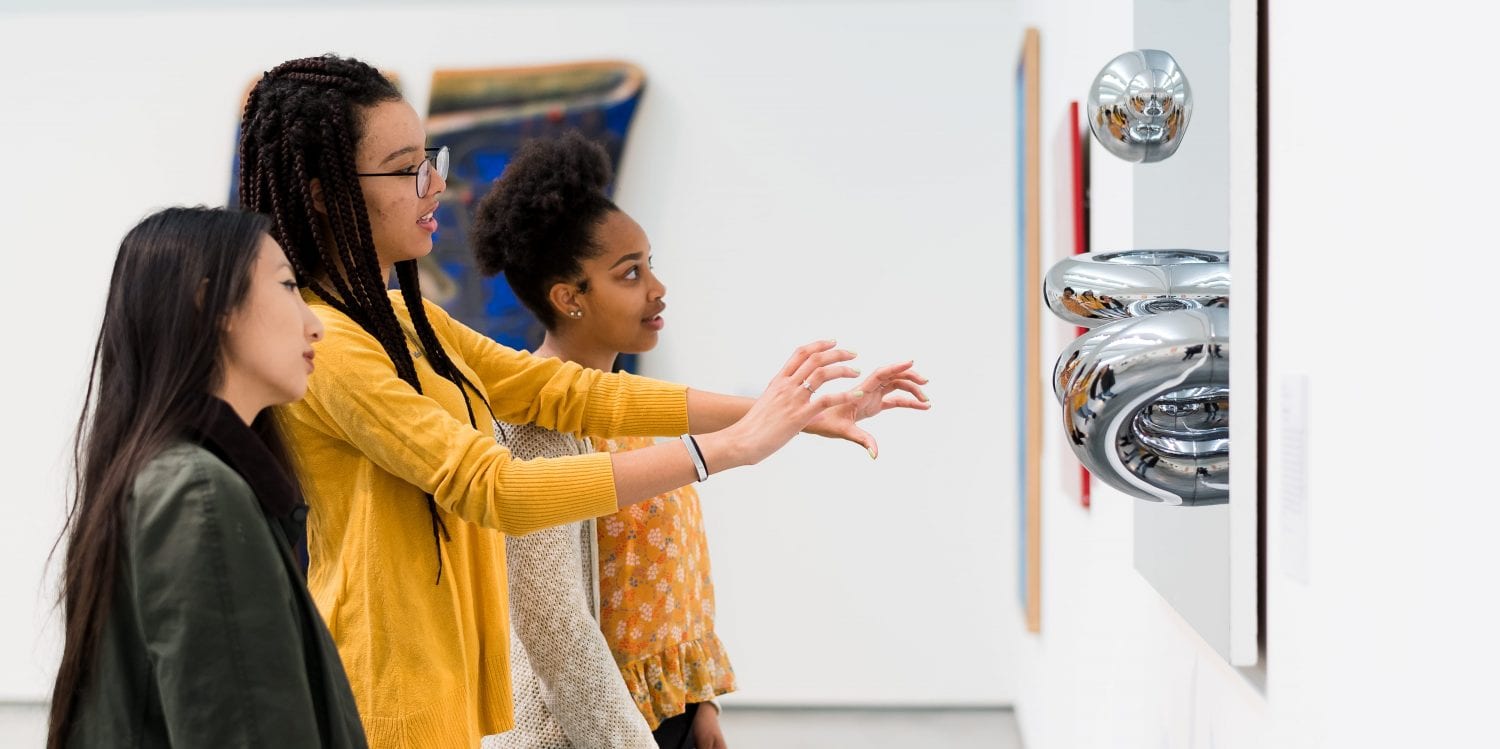
At first glance, Anna and I seem very different.
At second glance, or at an even deeper third look into our lives…you’ll still think we’re pretty different.
But ever since we introduced ourselves in our First Year Mentor group three years ago, Anna and I have clicked. She was one of the very first domestic students I ever met at Wellesley; I remember thinking how eloquent she was, and was shocked at how “ready” she seemed for college. She also reminded me of some of the U.S. military kids who went to my school in Tokyo, and of the American girl dolls my friends and I played with when we were young (read: my limited and skewed understanding of America pre-Wellesley). My image and understanding of Anna (and this country) has become more nuanced in the past three years, but this interview really made me appreciate my friend and her faith. Anna’s faith in her country, her God, and herself, as well as her obvious love of life, make me proud to know her and confident in the value of this Wellesley education we are receiving. Despite our differences, Anna and I share many beliefs that were only strengthened throughout our four years here.
Where are you from?
Anna grew up in Michigan with her mom and brother, but has also lived in Mexico, Hungary, Boston and California with her Dad. She graduated from a public high school in San Diego where she was heavily involved in student government and local politics. Her blended family of stepparents and siblings has always been encouraging and supportive, and her parents’ laid-back parenting style built a sense of independence and confidence in her that defines who she is today. As a senior in high school, Anna knew that she wanted to continue her education and strengthen her passion for politics in college, hopefully on the East Coast – which is how she got to looking into Wellesley.
Why did you come to Wellesley? Why did you stay?
Spring Open Campus helped Anna make the decision to come here. “There was a panel for visiting high school students to attend. I walked into the chapel and saw four women, seniors, talking about their Wellesley experience and thought ‘I want to be thatfour years from now.” When Anna told me the other schools on her list – other seven sisters’ colleges – I asked if she’d always wanted to go to a women’s college.
“I started off looking for small liberal arts colleges on the East Coast…I didn’t know this at the time as a stubborn high schooler, but women’s empowerment and opportunity were huge to me. I have better words to describe it now, but I realized that all-women’s institutions really help us become who we are. I don’t think I would have experienced that or allowed myself to explore that if I hadn’t actually come to one.” Anna spoke of experiencing positive shifts in worldview in the past three years. She had always been civically engaged, in her extracurricular involvements in high school especially, but Wellesley helped confirm her belief that on top of understanding ourselves, we should be striving to understand others and help others become their best selves.
“I came into Wellesley as a Republican and still am a Republican. I came in much more conservative than I am now, but by Wellesley standards I am definitely on the conservative end of the spectrum…but I guess that’s not saying much, considering the skew of the school,” she smiled.

Anna spoke about experiences she had had in her political science classes that made her realize the lack of “diversity of thought in classrooms” at this school. After being shut down for sharing her views in class by other students, repeatedly being told “no you’re wrong!” without an explanation or conversation that followed, she decided to use the discomfort and frustration she felt “as fuel to understand” others.
“I’m definitely not the norm, politically, at Wellesley.” While we did not go into details about our political alliances during the interview, Anna explained to me that her conservatism stems from her beliefs in limiting the power of federal government and in views about foreign policy. She also said that she wished she had known what she was getting into, the kind of intellectual and social environment on this campus and the challenges that would bring, before coming here.
But being at Wellesley has opened her eyes and pushed Anna to question the identity she and her peers had created in high school. “There’s more than latching on to political identity. And it’s been freeing for me to realize that I can be super conservative on some issues, and very progressive and liberal in other ways. Because political ideology is not who we are; we shape our own ideology.”
Having friends of diverse backgrounds who teach us the complexities of gender and race has made this transition possible for Anna. She met many of these friends through AGORA, the political society on campus; “AGORA was a big part of what kept me at Wellesley when I began to doubt my place here,” Anna says. The society showed her that a strong bond of sisterhood can be achieved even with differing political affiliations among individuals. Seeking a diversity of opinions and counteracting the echo chamber that we often create for ourselves is an important lesson learned at Wellesley, one that I realize we all need to learn – especially considering the political climate of this country today.
Have you found home, passions, purpose at Wellesley?
Anna’s involvement in the ROTC program has given her a deeper and fuller understanding of the Army, as well as a great co-ed military experience to complement the very female-oriented atmosphere at Wellesley. Anna received a 4 year scholarship through ROTC and, in return, is obligated to serve in the U.S. Army after graduation. Through waking before the sun four times a week, organizing meetings and training sessions for 60 other cadets in the Greater Boston Area, on top of doing Wellesley work, Anna has gained a deep appreciation for discipline and teamwork.

Anna’s faith has also given her purpose at Wellesley and in life. She tells me that people often come to her looking for advice, seeking to answer big questions like “What does it mean to be Christian, especially today?” So what does Christianity mean to Anna? “To me Christianity means preaching love, inclusion, and acceptance. It means honoring one another in brotherly love. It means remembering the good news of the Gospel in times of difficulty and trial. At the end of the day, we are saved and cared for and are in this awesome relationship with our Christian God – a father-child relationship where He is always there, never abandoning us. Even if we stray, we can always go right back to Him… and that understanding, that belief, has provided me a lot of solace over the years.”
What are some summer/winter session highlights? Did you go abroad?
Anna did not study abroad but had some winter and summer session experiences that completely altered her trajectory. During her first year summer when she “was still in love with politics,” Anna worked in data analytics for a political consulting firm in DC. During her sophomore summer, she went to Chile for a month and then to Georgia to attend the Army’s Basic Airborne Course at Fort Benning as part of her military training. It was during this training that Anna began to formally discern a call to be a chaplain. When she found out that ordained ministry was something woman can do, Anna started to seriously consider chaplaincy as her way of serving her country.
The dominant, strengthening, and uplifting role faith played in her own life as well as the lives of others was what ultimately led Anna to apply to divinity school and pursue a career as an Army Chaplain. “As Army Chaplains, we have our own faith traditions but we’re also responsible for catering to the spiritual needs of all people [of faith or no faith traditions]. So while I’ll be a Protestant chaplain, if someone who is Hindu needs spiritual guidance, I need to be able to give them whatever it is they need,” Anna explained.
Anna spent winter session last year doing military history research at the US Army Heritage and Education Center. This past summer, she went to Kentucky for Advanced Camp, a training program mandatory for all Army cadets, and then to Fort Bragg, North Carolina where she had the opportunity to shadow a chaplain.
What next?
One day, Anna may serve in politics. Right now, she is focused on militarily serving her country and on growing her faith, for herself and others. Anna will be heading to Divinity School in the fall, which will set her on the path to becoming an active duty Army Chaplain. Before graduate school, she hopes to fall off the grid for a little while, to give herself time to exist, and to be free of obligations.
Advice?
“It always works out, whatever ‘it’ is,” is advice that doesn’t seem particularly helpful, but is something Anna’s dad always reminded her of when times get rough. She’s come to realize, though somewhat begrudgingly, that he was right. ‘It’ does work out. Wellesley has also taught Anna the “importance of being authentic” and of writing our own definitions of success. In her pursuit of becoming successful by other people’s standards, Anna realized she was living selfishly, generally unfulfilled, and felt like she was missing something. Her determination to be a source for positive change in people’s lives did not develop overnight – it was only after much self-reflection and reevaluation that she has come to seek a path being a leader of faith.
Anna, thank you for taking time out of your packed-to-the-brim life to do this interview with me. You are one of the many people I’ve been so lucky to meet on this campus that truly embody the Wellesley motto,(not to be ministered unto but to minister), of servant leadership and compassion.
The end.

